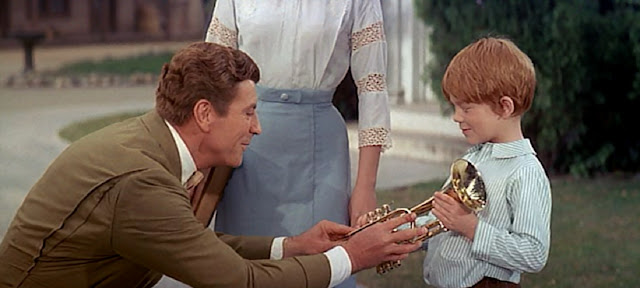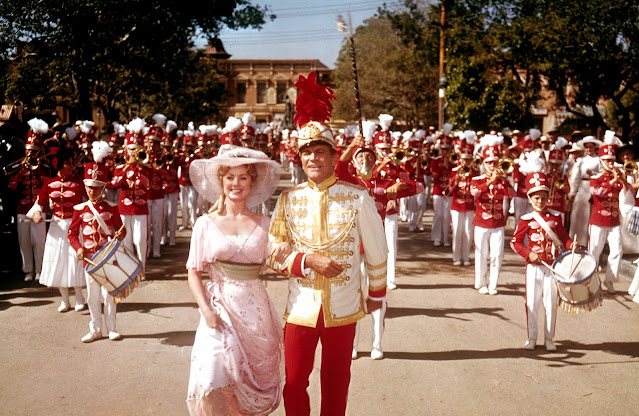There is nothing quite like a lavish adaptation of a stage musical for the big screen. Big musical productions, elaborate choreography and the occasional surprise when a performer, not known for their singing or dancing, proves that they not only can do it but that they deserve to be there, too. The Music Man has all of that and more. I have seen my fair share of musicals over the years but up until today I had not seen this one. I knew I was in for a treat right out the gate with that strange, yet beautifully offbeat Rock Island, a song sung on a train as the film’s main character, Harold Hill (Robert Preston), arrives in town with the intent to con money out of the citizens and disappear again before they can figure it out. This number sets the tone for a movie that will be full of fast talking and quick wit, much like Harold who will have to do a lot of fast talking to avoid getting found out before he gets the townsfolk’s money.
The year is 1912 and professional con man Harold Hill arrives in the sleepy little town of River City, Iowa with the intent to swindle the citizens. His traditional con amounts to convincing the townsfolk to pay to create a boys’ marching band with Hill faking being a professional musician with expertise, then skipping town once he has got their money for instruments, instruction and uniforms. Coincidentally, River City is the new home of his former associate, Marcellus Washburn (Buddy Hackett). With Marcellus’s help, Harold sews discontent in the hearts of the citizen’s minds over the installation of a new pool table in town, convincing them that it will lead the town’s young boys into a life of sin and gambling. Instead, he promotes the idea of signing the kids up for a marching band under his tutelage, for a small upfront fee, of course.
His usual methods factors in some townsperson, usually the librarian, who will see through his ruse. To combat this inevitability he arranges to meet up with the girl, Marian Paroo (Shirley Jones), and woo her, thus distracting her away from exposing him for a fraud. Likewise, when the town school board tries to get his credentials he distracts them by convincing them that they are a natural barbershop quartet. Wooing Marian proves to be harder than he initially anticipated as she is weary of him from the start. He will eventually succeed in getting her to fall for him but what he didn’t anticipate is falling for her as well. On top of that, his wooing doesn’t distract her enough as she quickly figures out he is not who he says he is.
When The Music Man released in theaters back in the summer of 1962 it was met with critical and commercial acclaim, becoming one of the most profitable films of the year and getting nominated for six Academy Awards including Best Picture. Robert Preston reprised his role as “Professor” Harold Hill from the Broadway play. This casting is nothing short of inspired as it requires an actor with the ability to fast talk through the rat-a-tat dialogue and make it look effortless. On top of that he has to make the character likable while at the same time being technically the villain of the piece. This is a delicate balance that he has to maintain for two and a half hours, always keeping us on his side while keeping one step ahead of those who are on to him. His attempts to woo Marian, while initially shady in intent, never play out too darkly. There is a rousing musical number inside the library as he makes his intentions clear to her that is played tongue-in-cheek, beginning with the library patrons shushing him for being too loud and ends with all of them joining in on the singing and dancing.
Buddy Hackett would not be my first choice when casting for a song and dance role. Yet he does an excellent job playing the comedic sidekick role. When he does finally have a musical number of his own he is surprisingly spry on his feet and his song, Shipoopi, is the perfect level of humor and gibberish. This number would become iconic and utilized in many other shows and movies as an homage to this show. The term, Shipoopi, has no meaning and was invented by songwriter Meredith Wilson specifically for this show. Hackett, whose schtick was speaking with a slurred, somewhat muddled, accent, shows that he is capable of holding a note and singing a rapid paced song clearly. He also has some dance moves that he didn’t often get to show off.
Morton DaCosta, director of the stage play, produced and directed the movie as well. This was done to ensure that the film stayed faithful to the play. Even so, changes were made including heavily altering certain songs as well as replacing one for an all new number. The play also used some regional dialect that was dropped to help it appeal to a broader audience. Other than that it largely stayed faithful to the stage. This has the unintentional consequence of giving it a bit of a claustrophobic feeling at times where the limits of the stage can still be felt on screen. This is minimized somewhat by opening up the musical numbers, utilizing multiple stories inside places like the library to open up the production and boost the energy of the scenes.
Marian, despite figuring out Harold’s intentions, changes her mind about him when his influence begins to open up her younger brother, Winthrop (Ronny Howard), a shy young boy with a speech impediment. He begins to join in with the townspeople’s singing and speaks excitedly about his new cornet. As Harold is being pressed by Marcellus to leave town as the people have gotten wise to his scheme, he meets up with Marian only to learn that she has been on to him all along. She urges him to leave, too, but now he doesn’t want to leave. He has fallen for her, too, and wants to stay with her. He will get that chance after he is arrested and has to prove before the court that he has indeed created a band amongst the boys in town. They may not be very good as he is one lousy teacher but the townsfolk are delighted the boys are playing music nevertheless.
This is a long film but it never feels like it is. As a faithful adaptation of a stage play it has a definite pacing befit of that format. This means there is a natural moment at the midway point that feels like it’s building to an intermission. None comes but it’s obvious where it would have been were this on stage. This never escapes that feel of a play filmed for the big screen. Some productions alter things so much in an attempt to hide the origins of the story and others just film the play as is. Both options have their pros and cons and some work better with one option over the other. 1982’s Annie altered things heavily and the film suffers a lot from that choice. 2012’s Les Misérables stayed too faithful and felt uninspired as a result. The Music Man opts for the faithful route and that was the right choice. This story doesn’t need to be dramatically altered to make for an effective movie. The limited setting works fine for a film while opening up the song and dance numbers brings an energy that is hard to duplicate from the stage. That energy carries the film and makes it an absolute delight to revisit on the big screen.
Academy Award Nominations:
Best Picture: Morton DaCosta
Best Art Direction - Color: Paul Groesse and George James Hopkins
Best Costume Design - Color: Dorothy Jeakins
Best Film Editing: William H. Ziegler
Best Musical Score - Adaptation or Treatment: Ray Heindorf (won)
Best Sound Recording: George Groves
____________________________________________________
Release Date: June 19, 1962
Running Time: 151 Minutes
Rated G
Starring: Robert Preston, Shirley Jones, Buddy Hackett, Hermoine Gingold and Paul Ford
Directed By: Morton DaCosta









Comments
Post a Comment